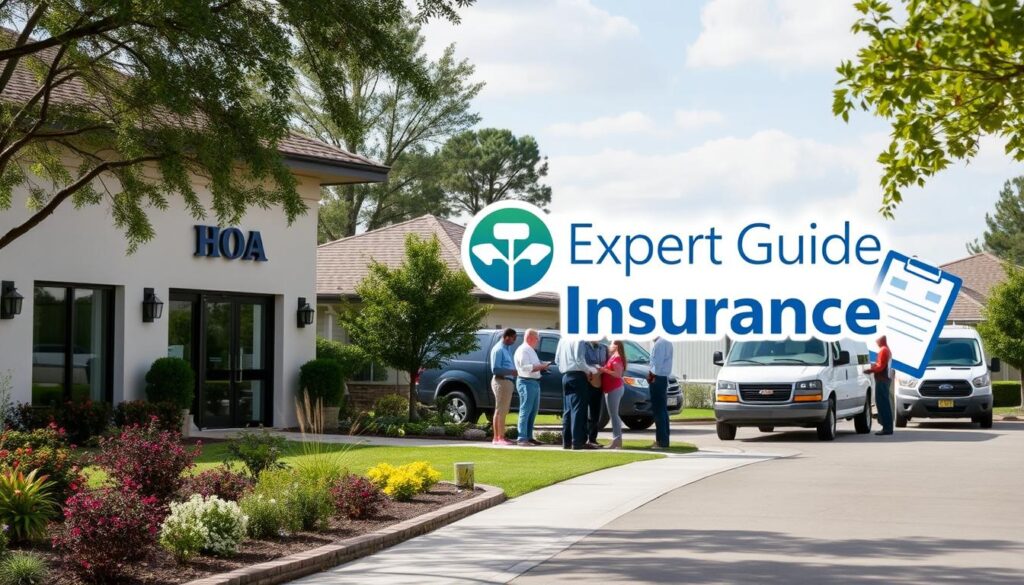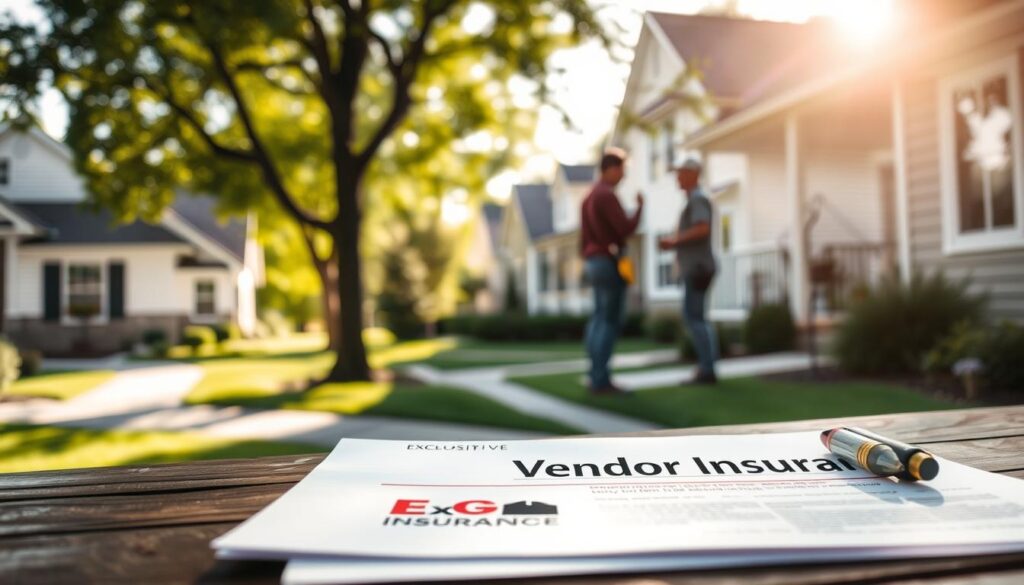Homeowners groups in California need to see if workers have the correct licenses and insurance. This is to protect the HOA from possible legal issues. If they don’t check, they could face expensive lawsuits.
This article will cover what vendor insurance is, why HOAs need proof of coverage, and what insurance contractors should have. Knowing this helps HOA boards keep their communities safe and sound. Check more insurance ideas with our expert.

Key Takeaways
- California law says HOAs must check that contractors have the right licenses and insurance before letting them work in shared spaces.
- Using vendors without insurance might be a serious mistake, causing arguments and lawsuits.
- Vendor insurance generally includes coverage for accidents, worker injuries, company cars, cars not owned by the company, business-related crime, and completed projects.
- HOAs should request vendors to possess a minimum of $1 million in general liability insurance and worker compensation coverage.
- Contracts must clearly mention that vendors work independently and are not employees of the association to protect against problems..
Understanding Vendor Insurance for HOAs
Vendor insurance, also known as contractor insurance, is key for HOAs. It protects them from costly lawsuits due to contractor mistakes. Without hoa vendor insurance, the HOA could face big financial and legal issues.
What Is Vendor Insurance?
Vendor insurance helps HOAs stay safe and comply with rules. It covers risks like property damage and injuries. By making sure vendors have the right contractor insurance requirements, HOAs can manage risks better. To better understand follow check what is the vendor insurance.
Why Is Vendor Insurance Important?
Vendor insurance is vital for HOAs. It acts as a safety net against unexpected incidents. Without it, HOAs could face huge financial and legal problems. When vendors have insurance, HOAs avoid these risks.
“Vendor insurance serves as an important protection for HOAs against the money and legal problems from contractor errors or carelessness.”

In summary, vendor insurance is essential for HOAs. It helps them follow rules and protect against risks. By making sure vendors have the right contractor insurance requirements, HOAs can keep their community safe.
Should HOAs Require Vendor Insurance?
Homeowners’ associations (HOAs) are not simple. The topic of vendor insurance is key. Some states require HOAs to ensure vendors have insurance. Even without laws, it’s smart for HOAs to ask for vendor insurance. HOA vendor insurance requirements.
Accidents can happen, even with licensed professionals. They might damage property or hurt people. Without insurance, the HOA could face expensive lawsuits. It could also be seen as not protecting the community well.
- General liability insurance should be specific for contractors in certain HOAs.
- Vendors need workers’ compensation insurance for injured employees.
- Commercial auto/vehicle liability insurance is vital for driving-related accidents.
HOAs should ask vendors for insurance proof. They should be added as an “additional insured” on policies. This protects the HOA from lawsuits.
By following hoa risk management best practices, HOAs can keep their communities safe. They must also follow state laws for contractor insurance and governing document insurance mandates. This way, they meet their hoa vendor insurance requirements.

| Insurance Type | Coverage | Importance for HOAs |
|---|---|---|
| General Liability | Protects against bodily injury and property damage | Shields HOA from expensive lawsuits and claims |
| Workers’ Compensation | Covers lost wages and medical bills for injured employees | Ensures well-being of workers performing tasks for HOA |
| Commercial Auto | Covers damage and injuries caused by vendor’s vehicles | Protects HOA from liability related to vendor vehicle use |
“Proper vendor insurance requirements are key for HOAs to manage risks and protect the community’s assets.”
Non-Owned Auto Insurance
HOAs need to make sure vendors have non-owned auto insurance. This policy covers accidents or damages from vendors’ personal vehicles. It’s important because HOAs could be blamed for accidents if vendors don’t have this insurance.
Non-owned auto insurance is key for HOAs to manage risks. It protects the association from liability when vendors’ employees use their cars for work. By requiring this insurance, HOAs can avoid being financially hit by accidents or damages.
| Vendor Insurance Requirement | Importance for HOAs |
|---|---|
| Non-Owned Auto Insurance | Covers accidents or damages caused by vendors’ employees using personal vehicles for association work, protecting the HOA from liability |
| Commercial Auto Insurance | Covers vehicles owned or leased by the vendor, ensuring coverage for association-related driving activities |
| General Liability Insurance | Protects the HOA from third-party claims of bodily injury or property damage caused by the vendor’s operations |
| Workers’ Compensation Insurance | Covers medical expenses and lost wages for the vendor’s employees injured while performing work for the association |
By requiring non-owned auto insurance, HOAs can protect their community. This includes other important coverages. It ensures the HOA’s liability protection and meets contractor vehicle coverage requirements. This way, non-owned auto insurance for vendors helps reduce the HOA’s risks.
Commercial Crime Policy
Protecting homeowners associations (HOAs) from financial losses is key. A commercial crime policy is vital for this. It guards against employee dishonesty or theft, even from vendors who aim to act ethically.
This policy acts as a safety net for HOAs. It ensures they won’t face financial loss due to vendor employee misconduct. By covering incidents of vendor dishonesty, it keeps the association’s funds safe. This policy is a strong defense against commercial crime.
| Key Benefits of Commercial Crime Insurance for HOAs |
|---|
| Covers losses due to employee dishonesty or theft by vendor staff Protects the HOA from financial responsibility for commercial crimes Helps safeguard the association’s funds and assets Provides peace of mind and financial security for the HOA |
The value of a commercial crime policy is clear, given cases of employee theft. For instance, Andrew Kissel embezzled $3.9 million from a Manhattan condo association. Also, Susan Marie Lambert & Michael Medeiros stole $2.8 million from San Mateo’s Woodlake Condo HOA. These cases highlight the need for HOAs to have commercial crime insurance for contractors and vendor dishonesty coverage.
By getting a commercial crime policy, HOAs can protect their community. This ensures the financial health of the association and its members. It’s a critical part of any HOA’s insurance plan.
Completed Operations Coverage
Completed operations coverage is key for homeowners associations (HOAs) to protect themselves after a vendor’s work is done. This insurance helps cover any damages or issues that might happen after the project is finished.
For example, if electrical work causes a fire later, this coverage helps pay for repairs. It’s important for liability protection after project completion and coverage for post-job damages.
It’s wise for HOAs to ask vendors for completed operations insurance. This way, the HOA is safe from unexpected costs after the job is done. It gives them peace of mind knowing they’re protected.
“Completed operations coverage is a critical component of vendor insurance policies that HOAs should always verify. It ensures the association is covered for any issues that may arise after a project is finished.”
When checking a vendor’s insurance, HOAs should look closely at the completed operations coverage limits. They should make sure these limits meet their needs. This step helps protect the HOA from unexpected costs or liabilities after the job is done.
Verifying Proof of Insurance
Homeowners associations (HOAs) must look closely at insurance when choosing vendors. They should obtain copies of the vendor’s Certificates of Insurance (COI). These documents contain very important information such as the insurance provider, policy number, and liability limits.
HOAs should also make sure they are added as an additional insured. This gives the HOA extra legal protection.
Checklist for Confirming Vendor Insurance
To make sure vendors have the right insurance, HOAs can follow a checklist:
- Obtain a copy of the vendor’s COI
- Verify the insurance company, policy number, and policy period
- Confirm the vendor is named as the insured on the policy
- Check the liability limits meet the HOA’s minimum requirements
- Ensure the HOA is named as an additional insured on the general liability and auto policies
- Review the policy’s coverage details, including any exclusions or limitations
- Maintain a record of the vendor’s insurance documentation
A detailed check helps HOAs protect themselves and the community. It ensures vendors have the right insurance coverage before starting work. This checklist for vendor insurance confirmation is a key tool in the verifying contractor insurance process.
By carefully verifying contractor insurance and hoa insurance certificate requirements, HOAs can reduce risks. This keeps people safe and healthy in their community.
Do HOAs have to get insurance proof from workers?
Homeowners associations (HOAs) look after common areas and hire workers for jobs. Getting proof of insurance from these vendors is key to managing risks. While state laws vary, it’s wise for HOAs to check contractors’ insurance before work starts.
In places like California, laws require HOAs to check vendors’ insurance. Even without laws, many HOAs’ rules say they must hire insured contractors. Getting proof of insurance is vital to protect the HOA and its members from financial and legal risks.
Verifying Contractor Insurance
To be sure that contractors have insurance, HOAs take these steps:
- Request a certificate of insurance (COI) from the contractor that shows their coverage.
- Verify the insurance remains current and includes the work involved.
- You should list the HOA on the contractor’s insurance policy as an “additional insured.”
These actions probably reduce the risks of employing contractors who lack proper insurance. This protects the community and its assets.
Legal Considerations
There are also legal reasons for HOAs to check contractor insurance. Some states have laws about insurance for contractors on community properties. Getting legal advice helps HOAs make clear policies and follow state and local laws.
By focusing on contractor insurance, HOAs can protect their community. They can also build better relationships with vendors and keep the association financially stable.
Employment Status and Independent Contractors
Homeowners associations must watch out when dealing with vendors. They should check if the vendor is an independent worker, not someone on their staff. This matters a lot to dodge legal problems since the HOA might get blamed for what the vendor does if treated like an employee.
HOAs should work with experienced lawyers. They need to make sure their vendor contracts clearly say the vendor is an independent contractor, not an employee.
Having the right hoa independent contractor policies is key to avoiding employee misclassification. HOA errors could lead to big legal and financial problems. Clearly stating that the vendor is an independent contractor helps the HOA avoid blame for vendor mistakes or responsibilities.
Also, vendor contract requirements must be detailed to protect the HOA. They should include what work needs to be done, when it’s due, insurance needs, and other important details. This ensures a good and legal partnership.
“Giving tasks to property managers doesn’t free directors from their important duties to the association. HOA directors must check that all service providers have the right licenses and insurance.”
By following the best practices for hoa independent contractor policies, HOAs can avoid the problems of misclassifying employees. This helps them have a good working relationship with vendors. It also protects the association and its members from legal and financial risks.
HOA Workers’ Compensation Insurance
Homeowners associations need to have workers’ compensation insurance. This is important even when they don’t hire people directly. This insurance is key to protect the HOA from liability if someone gets hurt while working for them.
Without it, the HOA could face huge costs for medical bills and lost wages. This could be a big financial hit.
Why Is HOA Workers’ Comp Important?
Many states require employers to have at least $100,000 for bodily injury and $500,000 for disease-related injuries. In North Carolina, the National WC Program paid $11,677 for a manager’s hernia. The annual premium for HOAs is about $570.
Covering Volunteers and Board Members
When they are sick or injured on the job, workers’ compensation insurance provides financial help to employees, volunteers, subcontractors and contractors. This is key because HOAs often work with many vendors, raising the risk of injuries. HOAs should screen vendors well and ask for worker compensation coverage annually.
HOAs need to work closely with their insurance provider. They must ensure their policy covers all workers, including vendors, volunteers, and board members. This coverage is as important as other insurance policies, as workplace injuries can lead to big financial losses if not covered well.
“Homeowners associations should consider workers comp insurance of equal importance to other insurance policies, as workplace injuries can result in significant financial burdens if not adequately covered.”
In California, employers must buy no-fault workers’ comp insurance for all employees, even if there’s only one. North Carolina requires it for organizations with three employees. The National WC Program has paid $102,972 for a board member’s injury in Virginia and $24,000 for a maintenance worker’s injury in Illinois.
HOAs can expect to pay about $570 a year for ‘If Any’ workers’ comp coverage. The cost can change based on the HOA’s size, type of work, number of volunteers and employees, and history of illnesses and injuries.
Managing Vendor Risks
Homeowners associations should be careful when choosing licensed vendors. Licensed vendors might lack enough insurance, putting the HOA in danger. Important to look into subcontractors working for vendors to see if they have proper coverage.
Licensed but Uninsured Contractors
The Community Associations Institute (CAI) says HOAs face risks like property, liability, net income, and personnel. Human and technological hazards are big risks for property. Liability can happen if someone is hurt because of someone else’s mistake.
Managing vendors well is key to avoiding these risks.
Screening Subcontractors
Community managers often hire vendors for HOAs. Vendors need to show proof of insurance, licensing, and certification before working. Using vendor management platforms helps automate checking for compliance.
HOAs usually want vendors to have at least $1 million in liability insurance. But, they can set their own limits. It’s important to check for the right documents and make sure vendors follow the rules to avoid financial and legal problems.
Vendor management platforms can make it easier to check for compliance. If vendors aren’t checked, it could lead to damage in common areas. This might stop residents from using these spaces.
To keep a community safe and well-run, managing vendor risks for hoas is key. This includes screening subcontractors and verifying insurance coverage of licensed but uninsured contractors. A good hoa vendor vetting process helps protect the HOA from legal and financial issues.
Conclusion
Homeowners associations are key in keeping communities safe and well-kept. But, they must handle the risks of hiring vendors and contractors carefully. It’s important to ask for proof of insurance from these service providers.
This step protects the HOA and its residents from possible legal troubles. When vendors hold the right insurance, the HOA probably avoids big financial and legal problems. This covers general liability, workers’ compensation, and commercial auto insurance.
Checking and keeping an eye on vendor insurance is a smart move for HOAs. It helps keep the community safe and stable for the long term. The right insurance for vendors and good risk management practices are vital for HOAs.
They help protect the community from legal troubles and keep everyone’s interests safe. This way, HOAs can run smoothly and responsibly. They can also keep their residents, assets, and finances safe.
By focusing on this part of risk management, HOAs can create a better and safer place for everyone. This makes the community a great place to live for all.
FAQ
Should HOAs ask contractors to show insurance?
Very smart for HOAs to request insurance proof from contractors. Some states require it by law. Even without laws, many HOAs follow this rule to protect themselves.
What is vendor insurance?
Vendor insurance, or contractor insurance, protects HOAs from liability. It covers damages or injuries caused by contractors. This insurance is key to avoid expensive lawsuits.
Why is vendor insurance important for HOAs?
Vendor insurance keeps HOAs safe from liability. Without it, HOAs could face big financial and legal problems. It’s a must-have to protect the community.
What standard insurance policies should HOAs require from their vendors?
HOAs need to check for specific insurance policies. These cover general liability insurance, workers’ compensation, and commercial auto insurance. They protect the HOA from various risks.
What is non-owned auto insurance, and why is it important for HOAs?
Non-owned auto insurance covers accidents by vendors’ personal vehicles. It’s vital to protect the HOA from liability in such cases.
Why should HOAs require a commercial crime policy from their vendors?
A commercial crime policy guards against theft or dishonesty by vendors’ employees. It’s a way to protect the HOA from unexpected losses.
What is completed operations coverage, and why is it important for HOAs?
Completed operations coverage helps after a project is done. It covers damages or issues that arise later. This policy is essential for HOAs’ peace of mind.
How should HOAs verify and monitor their vendors’ insurance coverage?
HOAs should review and verify insurance coverage carefully. They should get copies of certificates of insurance and ensure they are named as additional insured. A checklist can help confirm coverage.
What is the importance of maintaining HOA workers’ compensation insurance?
HOAs need workers’ compensation insurance, even without employees. It protects the HOA from liability if someone is injured while working. Without it, the HOA could face huge costs.
How can HOAs effectively manage the risks associated with hiring vendors?
HOAs should have a detailed vetting process for vendors. This includes verifying insurance coverage. Even with licensed vendors, it’s important to check their subcontractors too.
